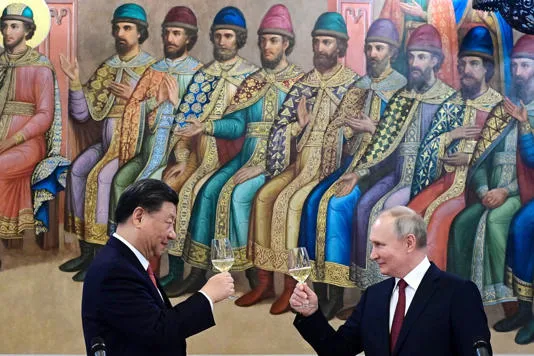When Russian President Vladimir Putin visits Chinese leader Xi Jinping in Beijing this week, they will aim to maintain a united front against the U.S.-led global order. However, their relationship is not one of equals.
China has been a crucial lifeline for the sanctions-hit Russian economy, providing a range of goods from electronics to machinery. While China accounts for about 33% of Russia’s trade, Russia makes up only 4% of China’s trade. China supplies key materials for Russia's weapons production, while Russia's arms exports to China have declined. Additionally, Russia, facing rejection in Europe, has had to offer discounts to China. China has used its leverage to negotiate gas pipeline deals with Russia.
This partnership, while strategic, is increasingly imbalanced in China's favor, according to Alexander Gabuev, director of the Carnegie Russia Eurasia Center. Despite this, the bond between the two nations has profound implications for the West, including heightened military collaboration and geopolitical rivalry across Africa and Asia. There are concerns in the West that China's support could help Russia win against Ukraine in a war of attrition.
In recent meetings, European leaders and Secretary of State Antony Blinken have urged China to reduce its support for Russia's defense industry. The threat of extending sanctions on Chinese banks could be influencing Chinese exports to Russia. Russian officials deny dependence on China, calling the relationship a partnership.
The economic ties between Russia and China have deepened, with bilateral trade reaching $240 billion last year. Russia's reliance on Chinese imports has increased, giving China significant leverage. The yuan has surpassed the U.S. dollar in Russia's exports, and Chinese manufacturers are filling the void left by Western brands.
Some Russian businesses are shifting operations to China due to Western sanctions. Norilsk Nickel, for example, is moving a portion of its copper-smelting operations to China. This deepening economic cooperation with China is seen as inevitable for many Russian businesses.
Despite concerns in Moscow about dependence on China, it is viewed as the only alternative to isolation under current circumstances. China's dominance in energy trade further strengthens its position, with Russia becoming increasingly reliant on Chinese markets. China's ability to tap other gas suppliers also gives it leverage in negotiations with Russia.
Overall, Russia's growing dependence on China is seen as a long-term shift that will shape its economic future for years to come.


